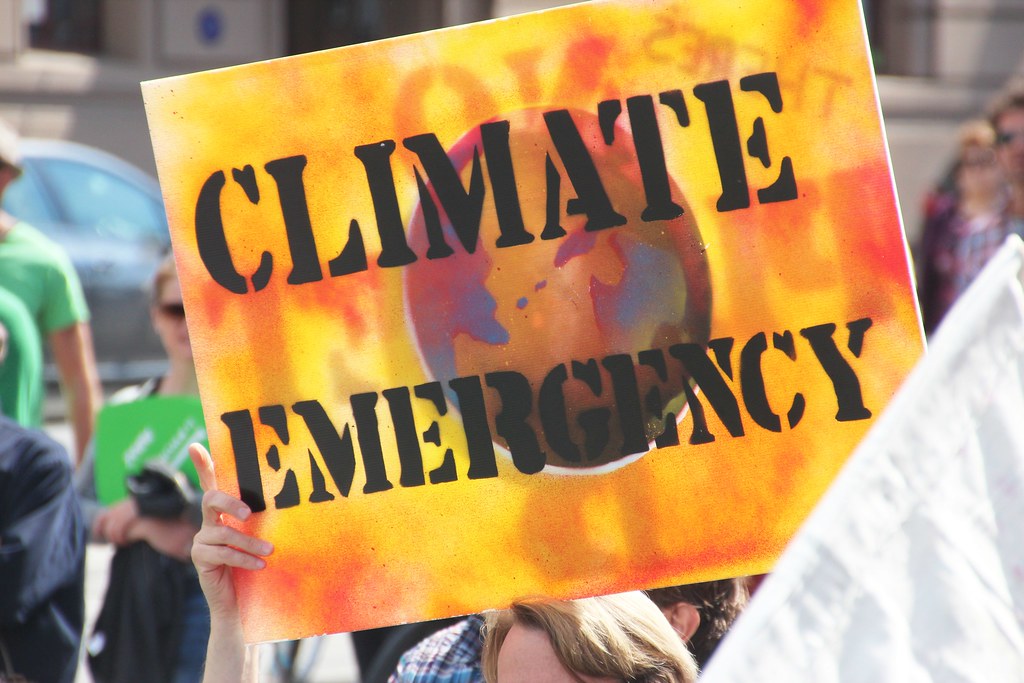Following yet another bad-faith betrayal from Sen. Joe Manchin, reports surfaced last week that President Biden was considering declaring a national emergency on the climate crisis. After many months of dedicated advocacy and both public and private pressure from environmental groups which insisted an emergency declaration was necessary to meet the moment, it seemed like Biden was finally ready to respond. But the declaration didn’t come, and in the days since, PoliticoPro’s EnergyWire and GreenWire have given spotlights to legal experts opining on the legal and political merits of such a declaration.
While we remain confident in the advantages, importance, and legality of a climate emergency declaration, there is room for legitimate debate between experts in the face of what could be a massive embrace of executive power from the president. The only problem? Many of the legal experts expressing skepticism about the legal future of the declaration have strong ties to the fossil fuel industry. It may be worth considering whether individuals with the future of the fossil fuel industry in mind should be allowed to thwart what other environmental law experts say could be a breakthrough in climate action.
Jonathan Brightbill
Jonathan Brightbill is one of the legal authorities who has been frequently quoted encouraging skepticism over the efficacy of a climate emergency declaration. The former Acting Assistant Attorney General for the Environment & Natural Resources Division under Donald Trump, Brightbill has situated himself as an authority on why a climate emergency declaration might fail on its merits while simultaneously opining on the allegedly minimal actual impacts such a declaration might bring.
Brightbill was a key figure in the Trump administration’s crafting of a national emergency to redirect funding for Trump’s border wall, a declaration which itself stretched (if not outright shattered) the bounds of legal standing and faced massive levels of controversy and suits. On what grounds does he now have to criticize the ‘merits’ of an emergency declaration for an actual emergency given his manufacturing of one lacking the same legitimacy for the former President?
Brightbill has also proven himself a longtime enemy of the environment, and is someone with a personal, political, and career interest in non-protections for the climate. He spearheaded the Trump administration’s legal attack on the regulatory scope and authority of the EPA and was a partner of Kirkland and Ellis LLC, the BigLaw firm with entrenched oil and gas ties whose clients include Kinder Morgan, Parker Drilling Company, Linn Energy, Ultra Petroleum Corporation, and PetroStar Services.
Jody Freeman
Jody Freeman is another critic of the need for, and efficacy of, a climate emergency declaration. Freeman is the Founding Director of Harvard Law School’s Environmental and Energy Law Program, a former Obama White House energy and climate adviser, and she also co-wrote a book titled Global Climate Change and U.S. Law with Michael Gerrard. For an objective commentator on the dire mandate of climate change, these are genuine qualifications, but Freeman is not that — she sits on board of directors for oil and gas giant ConocoPhillips. Given the context of her loyalty to a fossil fuel company still pushing for drilling projects such as the litigation-mired 30-year Alaska Willow Project, Freeman’s urging of Biden to focus on “smart, effective regulatory actions, rather than getting sidelined into a swirl of conflict and litigation,” begins to ring somewhat hollow.
Kathleen Sgamma
Kathleen Sgamma told EnergyWire that she expects any climate declaration that impacts federal oil and gas would run into legal hurdles similar to the current suits by Republican-led states over the social cost of carbon. Sgamma, of course, would love to see executive action on climate tampered — she is President of the Western Energy Alliance, which describes itself as “the voice of the oil and natural gas industry in the West” and brags that it represents over 300 companies involved in exploration and production of oil and gas.
Western Energy Alliance is also one of the groups that has sued the Biden administration over its ban on new oil and gas leasing.
David Bookbinder
David Bookbinder told PoliticoPro not only that “The National Emergencies Act is not a great provision” but that he thinks the Biden administration may have trouble making the case that the climate crisis qualifies as a national emergency.
Bookbinder, whose career began at corporate law firm Paul Weiss and who now leads the “center left and nominally libertarian” think tank Niskanen Center, was the Sierra Club’s Chief Climate Counsel for many years, including during the time the club was funded in part by Chesapeake Gas and advocated for gas as a “bridge fuel” away from coal.
After leaving Sierra Club in 2010, Bookbinder partnered with former ExxonMobil climate policy manager David Bailey to form Element VI Consulting, which “offer[ed] advice and insights to organizations interested in U.S. climate policy” with the specific goal of passing a carbon tax. Bookbinder himself represented oil and gas interests in a “variety of federal regulatory matters” during his time with Element VI, including in EPA rulemakings for cars and trucks. He told Politico’s Morning Energy in November of 2010 that his position “is remarkably consistent. […] I thought natural gas was a good energy choice when I was at Sierra Club and I think it’s a good energy choice when I’m working for the natural gas industry.”
Conclusion
Legal experts are free to have their own interpretations of law as well as their own beliefs about best political strategy. But when the experts criticizing the idea of a climate emergency declaration are fossil fuel-funded, their skepticism should be taken with several large grains of salt.
###
“Climate Emergency” by John Englart (aka Takver) is marked with CC BY-NC 2.0.

